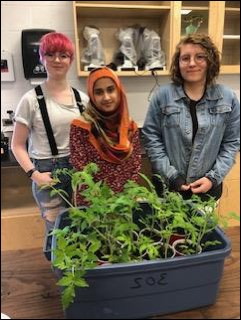The Hapnot Plant Club is using their skills to help the Lord’s Bounty Food Bank by donating tomato plants they grew in the school.
Kim Bryson, one of the supervising teachers on the plant club, said gardening is not the only lesson the program provides students.
“We definitely are trying to teach them sustainability,” she said.
“Not only by planting their own vegetables, but trying to show them how planting trees, recycling, how everything helps to improve our environment. They also learn a sense of community because we donate. So they take great pride in making sure that those plants are healthy and that they’re well cared for because they know that they’re going to people who can use them and who will get to have the enjoyment that we get from having fresh tomatoes, or peppers, or zucchini – whatever it is that we’ve got for them.”
The plant club is situated in the back of the Hapnot biology lab. Bryson said the area is like a little slice of summer during the long winter months.
“There is nothing more calming and more relaxing than to walk in to an area where you’re surrounded by green,” she said.
“We’re also surrounded by flowers because we start flowers again right in September. So we’ve had marigolds and we’ve had sunflowers and daisies all year round. It is extremely calming and students have [other] students have come in to check out the room and have commented themselves how nice it is and what a nice sedate place it is to be around. Plus, you walk in there, the smell of the fresh greenery is recognizable and it just takes you to spring and summer immediately.”
The plant club is able to teach gardening as a year-long hobby, but that presents different challenges for the students. Bryson outlined the kind of issues they faced through the year.
“Finding seed [can be difficult] sometimes, especially come winter time if we haven’t got a good supply from the year before,” she said.
“Getting soil has been an issue because we try to have fairly big things growing. Just trying to get garden soil – sometimes it’s hard. We also have had issues sometimes with little insects like spider mites that we’ve had to deal with. [Mites] can come in from somebody bringing in a plant that they had growing at home or in their garden in the summer and they brought it to us to kind of keep going. It can, you know, cause an infestation to everything that we’ve had, and we’ve dealt with that in the past. I guess that’s part of the learning experience that the kids get is dealing with all those unique problems. Everything in learning has a learning curve.”
Bryson explained the partnership with the Food Bank started when someone approached the plant club.
“We start herbs all year round,” she said. “We take bags of them up to the food bank so that they can use them when they’re doing their soups, or when they’re making stews or anything else that they’re having up there. This year, we’re providing not only container tomatoes, but we’re also providing take-home tomato, so any clients who go to the food bank and think, ‘Hey, I’d like to have a tomato,’ we will be providing those.”
The plant club is putting the finishing touches on their plants for the year, and will start up again in the fall.




